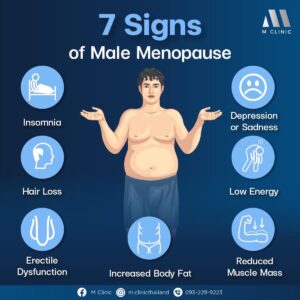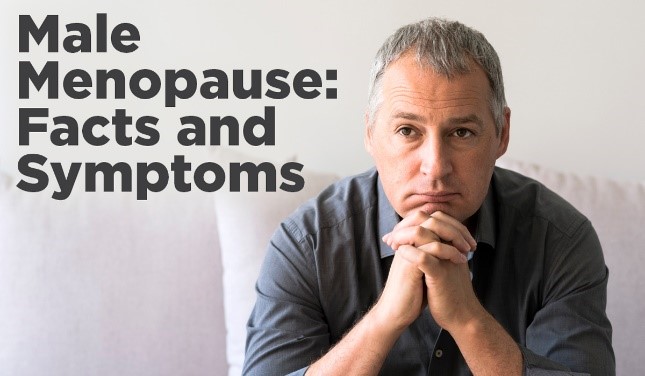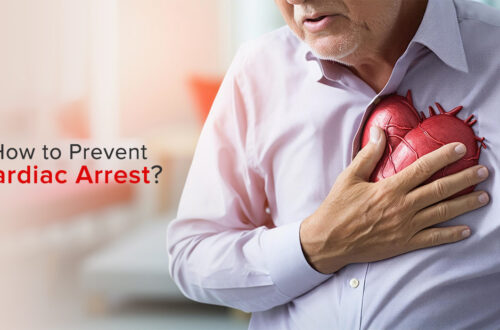Facts About Male Menopause
This article is about Male Menopause, however, menopause, often associated with women, is a natural phase of life characterized by hormonal changes and the cessation of reproductive capabilities.
However, what many people are unaware of is that men also experience a similar transitional phase known as male menopause, or andropause.
While male menopause is not as well-known or widely discussed, it can have a significant impact on men’s physical, emotional, and sexual well-being. In this article, we will delve into the concept of male menopause, its symptoms, causes, and potential treatments.
Understanding Male Menopause
Male menopause refers to the gradual decline in testosterone levels experienced by men as they age, typically occurring between the ages of 40 and 55. This decline is usually more gradual compared to the abrupt hormonal changes experienced by women during menopause. The condition is also referred to as andropause or late-onset hypogonadism.
Symptoms of Male Menopause:
The symptoms of male menopause can vary widely from person to person. Some common signs include:
Decreased energy levels: Men may experience reduced stamina, lack of motivation, and persistent fatigue.
Sexual difficulties: Decreased libido, erectile dysfunction, and reduced sexual satisfaction are often reported symptoms.
Mood changes: Feelings of irritability, depression, anxiety, and decreased self-confidence can occur during male menopause.
Physical changes: Increased body fat, reduced muscle mass and strength, hot flashes, and decreased bone density may be observed.
Sleep disturbances: Insomnia or disrupted sleep patterns can become more prevalent during this phase.
Causes of Male Menopause:

The primary cause of male menopause is the gradual decline in testosterone production. Testosterone, the primary male sex hormone, plays a crucial role in various bodily functions, including sexual development, libido, muscle mass, bone density, and mood regulation.
The decline in testosterone levels is a natural part of the aging process, but lifestyle factors such as smoking, excessive alcohol consumption, obesity, and chronic stress can exacerbate the condition.
Is there such a thing as “male menopause”?
“Andropause” (also called male menopause) is an unkind term sometimes used in the media.
This designation is misleading as it suggests that the condition is due to a sudden drop in testosterone in middle age, similar to what happens in menopausal women. That’s not true.
Men’s testosterone levels decrease with age, but from the age of 30 to about 40, they decline steadily at about 1% per year, and that itself is unlikely to be a problem.
Testosterone deficiency later in life, also known as late-life hypogonadism, can cause these symptoms, but often the symptoms are unrelated to hormones.
Personal or lifestyle issues
Lifestyle factors and psychological problems can also contribute to many of these symptoms.
For example, erectile dysfunction, low libido, and mood swings can be caused by:
– Emphasis
– Depression
– Fear
There are also physical causes of erectile dysfunction, such as smoking and heart disease, which can co-exist with psychological causes.
Mental health problems are usually caused by work or relationship problems, money problems, or concerns about aging parents.
A “midlife crisis” could also be the cause of this. This can happen when a man considers himself past half his life. Anxiety about what you have achieved so far, whether at work or in your personal life, can lead to periods of depression.
In some cases, when lifestyle or mental health issues don’t seem to be the cause, symptoms of “androgenic menopause” can be caused by hypogonadism, in which the testicles produce little or no hormones.
Hypogonadism may be present at birth and can cause symptoms such as delayed puberty and small testicles.
In some cases, hypogonadism can develop later in life, especially in men who are overweight and his type 2 diabetes.
This is called tardive hypogonadism and can lead to the symptoms of “male menopause.” However, this is a rare and peculiar condition that is not a normal part of aging.
The diagnosis of late-onset hypogonadism is usually based on symptoms and the results of blood tests that measure testosterone levels.
Treatment and Management:
If a man is experiencing symptoms associated with male menopause that significantly affect his quality of life, it is advisable to seek medical advice. A healthcare professional can evaluate the individual’s symptoms, conduct blood tests to measure testosterone levels, and recommend appropriate treatment options.
Hormone replacement therapy (HRT), which involves supplementing testosterone levels, is a common approach to managing male menopause. However, HRT should only be pursued after a thorough discussion with a qualified healthcare provider due to potential risks and side effects.
In addition to medical interventions, certain lifestyle changes can also help alleviate symptoms and promote overall well-being. These may include regular exercise, maintaining a healthy weight, consuming a balanced diet, managing stress levels, and adopting relaxation techniques such as yoga or meditation.
What to do
If you experience any of these symptoms, contact your primary care physician. Questions about your work and personal life will be asked to determine if your symptoms are caused by mental health problems such as stress or anxiety.
Talk therapies such as medication and cognitive behavioral therapy (CBT) may help if you are affected by stress or anxiety.
Exercise and relaxation can also help.
Read about:
– Deal with stress
– Anxiety treatment
– Helps treat low mood and depression
– Exercise against depression
– Breathing techniques for stress
Do I need hormone replacement therapy (HRT)? Your doctor may also order blood tests to measure your testosterone levels.
If the results suggest that you have low testosterone, you may be referred to an endocrinologist who specializes in hormone problems.
If a specialist confirms this diagnosis, testosterone replacement may be suggested to correct the hormone deficiency, which should alleviate symptoms.
This treatment can be given as an injection or as a gel.
Conclusion:
Male menopause, or andropause, is a natural phase of life that many men will experience as they age. While the symptoms and impact of male menopause can vary, it is essential for men to be aware of the changes they may undergo during this transitional period.
Seeking medical advice and adopting a healthy lifestyle can go a long way in managing symptoms and promoting overall well-being. By understanding male menopause, men can navigate this phase of life with confidence and optimize their health and happiness in the process.
Anxiety and an Anxiety disorder
Anxiety and an Anxiety disorder

A graduate of Computer Science and Information Management Technology. Diploma – Caregiving, Certificates – Dementia and Diabetes Awareness and Management. A researcher, blogger, songwriter, singer and acoustic guitarist. Born in an environment where natural talents such as healing are imparted at our natural birth. This natural talents of healing is the result of our genetic inheritance and the training from family environment.








